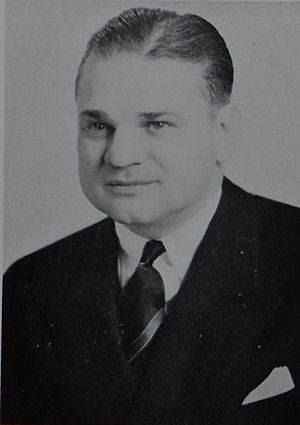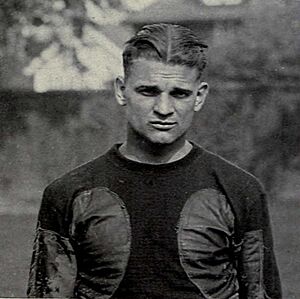Harry Kipke facts for kids
 |
|
| Biographical details | |
|---|---|
| Born | March 26, 1899 Lansing, Michigan, U.S. |
| Died | September 14, 1972 (aged 73) Port Huron, Michigan, U.S. |
| Playing career | |
| Football | |
| 1920–1923 | Michigan |
| Basketball | |
| 1921–1924 | Michigan |
| Baseball | |
| 1922–1924 | Michigan |
| Position(s) | Halfback, punter (football) Forward, guard (basketball) |
| Coaching career (HC unless noted) | |
| Football | |
| 1924–1927 | Missouri (assistant) |
| 1928 | Michigan State |
| 1929–1937 | Michigan |
| Baseball | |
| 1925 | Missouri |
| Head coaching record | |
| Overall | 49–30–5 (football) 9–8 (baseball) |
| Accomplishments and honors | |
| Championships | |
| Football 2 National (1932–1933) 4 Big Ten (1930–1933) |
|
| Awards | |
| Basketball All-American, 1924 Football Walter Camp Man of the Year (1970) |
|
| College Football Hall of Fame Inducted in 1958 (profile) |
|
Harry George Kipke (born March 26, 1899 – died September 14, 1972) was an amazing American athlete and coach. He played and coached American football, basketball, and baseball. He is best known for being the head football coach at the University of Michigan from 1929 to 1937. During his time there, his teams won four conference titles and two national championships in 1932 and 1933.
Kipke is one of only three coaches in Michigan football history to lead teams to four conference championships in a row. He also coached baseball at the University of Missouri for one season. In 1958, he was honored by being inducted into the College Football Hall of Fame as a player.
Contents
Early Life and Family Background
Harry Kipke was born in Lansing, Michigan, in March 1899. His father, Charles W. Kipke, came to the United States from Germany in 1872. His mother, Minnie Kipke, also came from Germany in 1888. Harry grew up with two older sisters, an older brother, and three younger brothers. When he was young, his father worked in a factory that made motors. Harry went to Lansing High School.
Playing Days at Michigan
Harry Kipke attended the University of Michigan, where he was a standout athlete. He was one of the few athletes in Michigan history to earn nine "letters" (awards for playing a sport well) across three different sports: football, basketball, and baseball.
In football, Kipke played as a halfback and a punter for the Michigan team, coached by the famous Fielding H. Yost. He was recognized as an All-American in 1922. Many people remember him as one of the best punters the school ever had. His skill at kicking the ball out of bounds close to the other team's goal line helped Michigan achieve an impressive record of 19 wins, 1 loss, and 2 ties from 1921 to 1923. Kipke was also the captain of the 1923 Michigan team that went undefeated with an 8–0 record and won a national championship. He wore jersey number 6 and weighed 158 pounds.
Coaching Career Highlights
After playing, Kipke started his coaching career. He was an assistant coach at the University of Missouri for four years. In 1928, he became the head football coach at Michigan State University. His Michigan State team finished that year with a record of 3 wins, 4 losses, and 1 tie.
The very next year, in 1929, Kipke was hired to become the head football coach for the Michigan Wolverines. His first year at Michigan was a bit tough, with the team finishing tied for eighth place in the Big Ten Conference. However, Kipke quickly turned things around. From 1930 to 1933, he led the Wolverines to four straight conference championships and two national titles. The teams in 1932 and 1933 were especially strong, not losing any games. They featured amazing players who were named All-Americans, like Harry Newman, Charles T. Bernard, Ted Petoskey, and Francis Wistert.
Kipke had a famous saying about his coaching style: "a punt, a pass, and a prayer." He also reportedly said, "A great defense is a great offense," meaning strong defense can lead to good attacking plays.
Helping Future President Gerald Ford
In 1934, Kipke's team had a difficult season, finishing with only 1 win and 7 losses. However, one bright spot was a player named Gerald Ford, who later became the President of the United States. Ford was the team's most valuable player that year.
Ford didn't have enough money to attend the University of Michigan. Kipke helped him get into the university. The principal of Ford's high school wrote to Kipke and invited him to meet Ford. Kipke met with Ford and his family. Even though there were no football scholarships back then, Kipke helped Ford find a job at the university hospital, waiting tables to earn his meals. Ford later said that getting the chance to go to the University of Michigan was "the luckiest break I ever had." In a speech in 1975, Ford joked about the tough 1934 season, saying, "what really hurt me the most was when my teammates voted me their most valuable player. I didn't know whether to smile or sue."
Between 1934 and 1937, Kipke's teams had a record of 10 wins and 22 losses. He resigned after the 1937 season and was replaced by Fritz Crisler. Before he left, Kipke recruited Tom Harmon, who would become a future Heisman Trophy winner, and advised him to stay at Michigan even with the coaching change.
Life After Coaching
After leaving coaching, Harry Kipke continued to be involved with the University of Michigan. From 1940 to 1947, he was a member of the Board of Regents of the University of Michigan, which helps govern the university. In 1942, he joined the United States Navy during World War II. Later, he became the president of the Coca-Cola Company in Chicago.
Kipke received many honors for his achievements. He was inducted into the College Football Hall of Fame in 1958 and the Michigan Sports Hall of Fame in 1968. Harry Kipke passed away in September 1972 in Port Huron, Michigan. Two days after he died, the crowd at Michigan Stadium had a moment of silence during halftime to honor him. Today, students, alumni, and fans can still remember Kipke's impact at Michigan when they see Kipke Drive, a road named after him, located right outside Michigan Stadium, also known as "The Big House."
See also
- History of Michigan Wolverines football in the Kipke years
- List of Michigan Wolverines football All-Americans
- University of Michigan Athletic Hall of Honor


